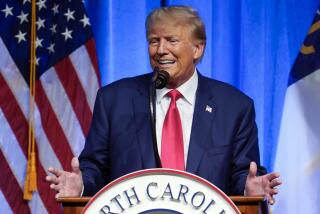Opposition in Myanmar plans to push for sanctions
Myanmar’s opposition says it will push for tough economic sanctions that could include measures against U.S. and other foreign oil companies if the military regime fails to heed the latest calls for reform.
After talks Tuesday with senior junta leader Gen. Than Shwe, United Nations special envoy Ibrahim Gambari held a surprise second meeting with detained pro-democracy leader Aung San Suu Kyi, who is under house arrest in Yangon.
Gambari did not disclose details of his discussions before leaving for U.N. headquarters in New York, where he is expected to brief Secretary-General Ban Ki-moon and members of the Security Council.
But opposition leaders have seen the former Nigerian foreign minister fail in previous missions to persuade Myanmar’s generals to loosen their grip after 45 years in power, and don’t want the current international outrage to pass without action.
At least 10 people, and some say as many as 200, have died since troops and police in Myanmar, also called Burma, last week violently crushed street protests demanding democracy.
“We hope that lives of these people have not been wasted,” said Soe Aung, spokesman for a coalition of exiled opposition groups.
Dissident leaders have long called for sanctions against foreign investors and companies that help the military stay in power, which Aung said included enterprises exploiting lucrative oil and natural gas fields.
“Although the military junta is calling it an open market economy, most of the businesses are controlled by the military,” he said.
Natural gas is the single largest source of revenue for the military government, according to New York-based Human Rights Watch.
“Gas exports accounted for fully half of the country’s exports in 2006,” the group said Tuesday in a statement calling on foreign companies to use their influence to end human rights abuses.
“Burma’s gas business brought in revenue of $2.16 billion in 2006 from sales to its main buyer, Thailand,” the statement said. “These funds flow directly to the government and provide the junta with a major source of financing that is completely independent of its citizens.”
California-based Unocal, owned by Chevron, is part of a consortium led by France’s Total that taps the Yadana gas field, one of the regime’s main sources of income, Human Rights Watch said.
Companies based in China, India, Japan, Russia and Australia are also among the leading foreign investors in Myanmar’s energy sector.
“Outside investment in Burma’s oil and gas industry has thrown a lifeline to the country’s brutal rulers,” said Arvind Ganesan, director of the group’s business and human rights program. “The businesses that help finance the military shouldn’t argue that the government’s crackdown is not their problem.”
Myanmar’s government has barred most foreign journalists, so on-the-ground details from within the nation are sketchy.
Some of the latest images transmitted by activists in Myanmar include video that purports to show the corpse of an executed Buddhist monk dumped in a river after soldiers and police officers fired on unarmed demonstrators and launched raids on monasteries.
From 1,000 to 2,000 people, including monks, have been arrested and detained in the former capital, Yangon, Aung said. Some of the monks have been moved to other provinces, he said.
Aung said he believed that Gambari “must have delivered a strong and clear message to them that this violent crackdown must stop immediately.”
“Whether the military is going to respond positively, we have to see.”
If the government delivers more “empty promises,” the U.N. Security Council should pass a binding resolution that sets out a timetable to negotiate reforms with the opposition, he said.
In January, China and Russia vetoed a Security Council resolution that would have demanded that Myanmar’s generals stop persecuting political opponents and ethnic minorities.
That “made the regime think that it has got a green light to continue to oppress their own people,” Aung said.
--
More to Read
Start your day right
Sign up for Essential California for news, features and recommendations from the L.A. Times and beyond in your inbox six days a week.
You may occasionally receive promotional content from the Los Angeles Times.






